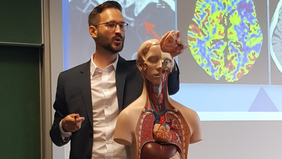Human medicine has two problems, says Prof. Dr Matthias Eckert. On the one hand, there are more and more elderly people who need medical help. And for another, medicine is becoming more and more complex. An example: 30 years ago, a stroke patient needed a doctor, a nurse and a bed. Today, an armada of specialists takes care of the patient. Surgeons, diagnostic instruments, various medications and effective rehabilitation intertwine. "Our health system is facing great challenges," says Eckert. The 34-year-old is the first medical doctor to be appointed by Ingolstadt Technical University (THI). In the winter semester, he is one of 14 new professors to begin their service - a new record appointment.
The radiology specialist links his appointment to the university with a concrete hope: "I see the solutions for the future challenges of our health system in automation, digitalisation and the application of artificial intelligence. In the future, computers should - indeed must - take over medical tasks." That is why courses of study like those in the "life sciences" are the future. They are the interface between medicine and computer science. The THI started the first two degree programmes in this field a year ago: Bio-Electrical Engineering and Computational Life Sciences. At the beginning of this semester, the new degree programme Life Science Management was launched, and for the coming winter semester, the Faculty of Mechanical Engineering is planning an addition in the direction of Biomechanical Systems.
The "Life Sciences" field of study is structured as a cross-sectional topic across all faculties. "Our goal here is to produce interdisciplinarily educated graduates who, as engineers, computer scientists or economists, combine a subject-specific qualification with basic medical training," says THI President Prof. Dr. Walter Schober. By 2030, around 1,000 students are expected to study in this field of study in Bachelor's degree programmes followed by Master's degree programmes.
In his lectures, Prof. Dr. Matthias Eckert makes sure that students will be able to talk to a doctor at a high professional level later on. The radiologist teaches anatomy, physiology, microbiology and human pathology. The latter is currently very popular with the students because of Corona, he reveals. Depending on the course of study, the students also have to deal with the business perspective on medicine or the technologies that are increasingly being used in it. In the case of a heart attack patient, can the data measured by his smartwatch on his wrist, such as blood pressure and heart rate, be forwarded directly to the doctor, and what technology can be used to measure these with clinical accuracy at all? How can computer tomography (CT) imaging be further improved? And will robots be able to relieve the nurses of tomorrow of heavy physical tasks?
During his time at the hospital in Ingolstadt, Prof. Dr. Matthias Eckert worked with one of six worldwide prototypes of neuroradiology. "Computer scientists and engineers were with us on every mission to gain practical experience and improve the prototype," Eckert says. "This is where I see my students standing in a few years." They are supposed to help make processes more efficient through the digitalisation of health care and give more people access to modern medicine.
Technological progress is exactly what we need now, the professors of the "Life Sciences" agree. Prof. Dr. Alexander Schuhmacher and Prof. Dr. Silke Wolfenstetter are new members this year. Wolfenstetter is an expert on digitalisation in the healthcare sector from a business perspective. Everything is becoming more digital not only in classical medicine, i.e. between doctor and patient, but also in the management behind it - key words electronic patient files or e-prescriptions. "A lot is happening here right now," says the 46-year-old.
Prof. Dr. Alexander Schuhmacher is an expert in pharmaceutical and biotechnology. Classical pharmacology is only one part of what he teaches his students in class: "Probably the most important part will be so-called genome editing, molecular biological techniques for the targeted modification of DNA - and not only the genetic material of humans, but also that of plants and animals." This genome editing opens up completely new therapeutic approaches, for example in the treatment of cancer or chronic diseases.
All three new THI professors are looking forward to their new role at the university. Prof. Dr. Matthias Eckert sums it up like this: "Helping people is super great, but sharing knowledge and thus having an even broader positive impact on our society is almost better."



![[Translate to English:] Logo Akkreditierungsrat: Systemakkreditiert](/fileadmin/_processed_/2/8/csm_AR-Siegel_Systemakkreditierung_bc4ea3377d.webp)








![[Translate to English:] Logo IHK Ausbildungsbetrieb 2023](/fileadmin/_processed_/6/0/csm_IHK_Ausbildungsbetrieb_digital_2023_6850f47537.webp)


